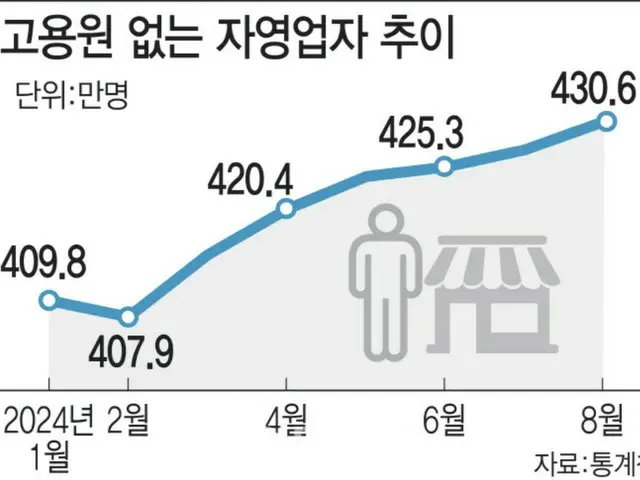According to the Korea National Statistical Office's national statistics portal, the number of self-employed people without employees last month was 4.306 million, down 64,000 from a year ago.
The number of self-employed people without employees has been declining for one consecutive year from September 2023 compared to the same month of the previous year. This is the 15th consecutive month from November 2017 to January 2019.
Last month, the number of self-employed people with employees was 1.44 million, up 27,000 from the previous year. However, the total number of self-employed people was 5.745 million, up 3.
The number of self-employed people without employees continues to decline, due to the business environment being steadily improving, including sales and operating profits, since the COVID-19 virus outbreak.
It is believed that an increasing number of businesses are going out of business due to the lack of recovery and the adverse factors such as high interest rates, labor costs, and sluggish consumption.
It is being analyzed that this is different from the situation during economic booms, when the number of self-employed people without employees decreased as a result of the conversion. The "yellow umbrella business closure deduction," which is paid to self-employed people who go out of business, has also been increasing recently.
According to documents submitted by the Ministry of Small and Medium Enterprises and Startups to Heo Jeong-sik, a member of the Assembly's Committee on Industry, Trade, and Resources, the yellow-skinned smugglers paid between January and July of this year were
The yellow umbrella closure deduction was 888.1 billion won (US$897 million), up 12.4% from the same period last year. The yellow umbrella closure deduction is a public deduction system to ensure the stability of the lives of self-employed people and provide security for their old age.
The business closure deduction increased from 614.2 billion won (US$606 million) in 2019 to 728.3 billion won (US$740 million) in 2020, and then increased to 728.3 billion won (US$751 million) in 2021, when the impact of the COVID-19 virus began to take hold.
It is set to continue rising to 904 billion won (US$970 million) in 2020 and 968.2 billion won (US$1.04 billion) in 2022. Last year, it was the lowest ever at 1.26 trillion won (US$1.075 billion).
The South Korean government has set aside a record 5.9 trillion won (US$6.34 billion) in support budget for self-employed people next year to help them get back on their feet and find new jobs after going out of business.
Next year, small self-employed people with annual sales of 104 million won (US$100,000) or less, the standard for simplified VAT taxpayers, will be temporarily exempted from delivery and home delivery fees of 300,000 won (US$32,300).
It will support prepayment fees for conversion guarantees worth 2 trillion won (about 215.1 billion yen) and lower interest rates for loan refinancing programs worth 200 billion won (about 215.1 billion yen) from 7%.
It was decided to lower it to 4.5%.
2024/09/19 10:13 KST
Copyrights(C) Edaily wowkorea.jp 107

